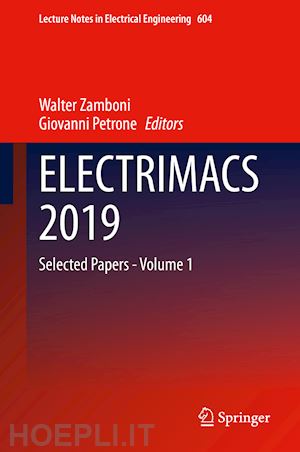

Questo prodotto usufruisce delle SPEDIZIONI GRATIS
selezionando l'opzione Corriere Veloce in fase di ordine.
Pagabile anche con Carta della cultura giovani e del merito, 18App Bonus Cultura e Carta del Docente
Giovanni Petrone is Associate Professor of Circuit Theory at the University of Salerno, Italy. His research areas include: analysis and design of power electronics and controls for photovoltaic, fuel cell and wind systems; tolerance analysis of electronic circuits; non-linear control techniques; wireless power transfer; and identification and diagnosis of renewable sources and storage systems.
He is Associate Editor of IEEE Journal of Photovoltaics and of IET Power Electronics, and is a Member of the editorial board of MPDI Applied Sciences journal. Since 2017 he is an IEEE senior member.
Prof. Petrone is co-author of more the 150 papers published in international journals and conference proceedings. He is also co-author of two books, two IEEE e-Learning library courses and five patents in the field of power electronics for photovoltaic applications.
Walter Zamboni received the Ph.D. degree in Electrical Engineering from the Università degli studi di Napoli Federico II, Italy, in 2004. Since 2016 he is an Associate Professor of Electrical Engineering at the Università degli studi di Salerno, Italy, where he has been assistant professor from 2008 to 2016. He is a member of IEEE and IMACS.
At present, his main scientific interests include battery modelling and SoC-SoH estimation, identification and diagnostics of batteries and fuel cells, and energy and power management in systems with energy storage. He co-authored more than 80 papers published in international journals and conference proceedings, and one patent.











Il sito utilizza cookie ed altri strumenti di tracciamento che raccolgono informazioni dal dispositivo dell’utente. Oltre ai cookie tecnici ed analitici aggregati, strettamente necessari per il funzionamento di questo sito web, previo consenso dell’utente possono essere installati cookie di profilazione e marketing e cookie dei social media. Cliccando su “Accetto tutti i cookie” saranno attivate tutte le categorie di cookie. Per accettare solo deterninate categorie di cookie, cliccare invece su “Impostazioni cookie”. Chiudendo il banner o continuando a navigare saranno installati solo cookie tecnici. Per maggiori dettagli, consultare la Cookie Policy.